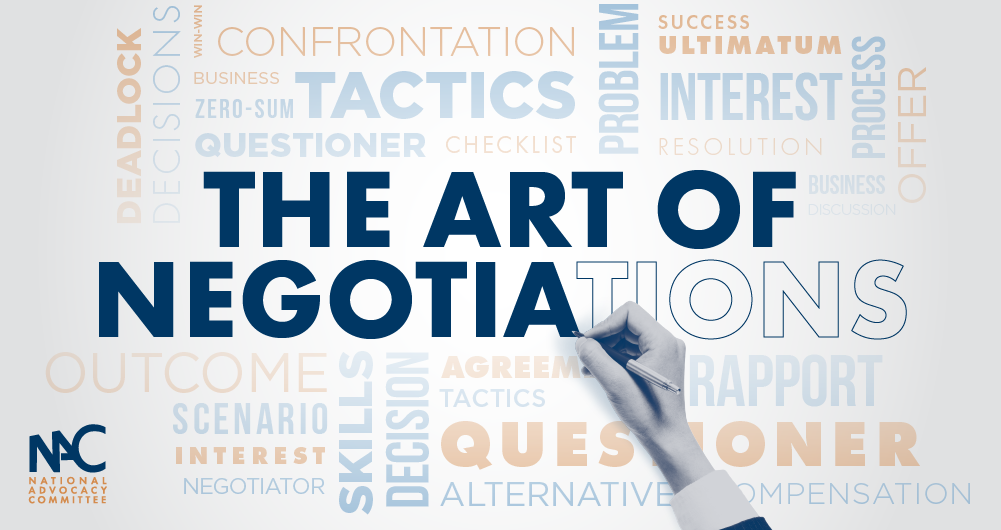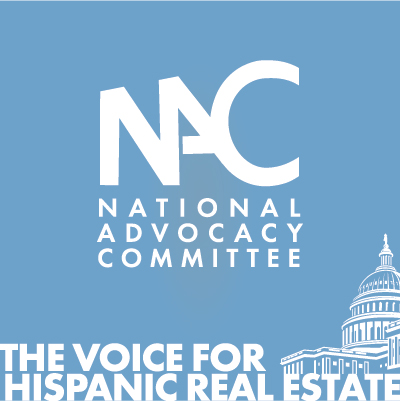Negotiation for Power
Celebrating NAHREP familia, cultura, politics, and grassroots action
November 11, 2021
Qué onda mi gente?!
First of all, Happy Veterans Day to all of our amazing veterans in our NAHREP familia. Thank you for your service, your sacrifice and your dedication to this country. All of you are our heroes and you are the embodiment of service to others.
Today’s blog is about negotiations. My dad is an expert bargainer, I think its inherent in our culture. I used to get embarrassed by how much he would bargain for everything, but he taught me some valuable lessons. I remember my dad taking me to the mercados to teach me how to regatear in Mexico. I’ve read books on the art of negotiations and even taken classes on it. The art of negotiations is something I’ve used in every aspect of my life, even when I bought my first home in the middle of the pandemic, in the worst housing inventory crisis we’ve ever seen. And, to be successful in business, you have to be a master negotiator. So, #IYKYK, you’ll recognize the elements of a good negotiation and bad negotiation as you’re reading this blog.
But why am I talking about this in a policy blog? Because the art of negotiation is critical to policy making. When you see our State of Hispanic Homeownership Report and you flip to our policy priorities for the year, it’s not just a wish list. It’s a list that we will have to fight for–and the fight takes a long time.

NEGOTIATIONS OVER INFRASTRUCTURE AND RECONCILIATION BILL
These past few weeks have been a case study of how negotiations work at the Federal level through the debate over the Infrastructure Bill and the Reconciliation Budget Bill (otherwise known as the Build Back Better framework.) I know that there was a lot of confusion as to what was going on, so for those of you who haven’t been following, here is a very simple breakdown:
Infrastructure Bill vs. Build Back Better: There’s two bills, and Congress passed the Infrastructure Bill last week, not the Build Back Better bill. Oftentimes, these bills have been lumped together, confusing even me in the process. More information on these bills to follow.
Build Back Better (BBB)/Reconciliation bill is where the drama is: This is at the core of the negotiation. First of all, after the passage of the Infrastructure bill, the Build Back Better package has been scheduled for a vote on Tuesday, November 15th. However, this bill is going to be harder to pass than the Infrastructure bill. The “progressives” who opted not to vote for the Infrastructure bill wanted the two bills to pass together, because they didn’t trust that BBB would pass otherwise. However, Senator Joe Manchin from West Virginia, demanded that the Infrastructure bill be passed immediately. And, the worst-case scenario for President Biden’s presidency and his ability to leverage any kind of power is for nothing to pass at all. If the Infrastructure bill fell apart, everything fell apart.
The Infrastructure Bill that just passed is not the one with our policy priorities: While this bill includes historic levels of investments to our roads, airports, and broadband internet (including a significant investment in Puerto Rico), etc… this does not include any of the bills we’ve been advocating for. This bill was paired down earlier this summer to include critical, uncontroversial elements that always had support from both Republicans and Democrats. In fact, 13 Republicans backed this bill.
The Build Back Better Bill is where our programs are: This is a quick summary of the programs currently included in the language of the Build Back Better bill:
Housing:
- $25 billion for the HOME Investment Partnerships Program to construct and rehabilitate affordable homes for low-income families, and $750 million for a new Housing Investment Fund to leverage private-sector investments to create and preserve affordable homes.
- $10 billion to offer down payment assistance to first-generation homebuyers, and $5 billion for the Home Loan Program to subsidize 20-year mortgages for first-generation homebuyers.
- $3 billion for a new Community Restoration and Revitalization Fund offering competitive grants to local partnerships led by nonprofits for accessible housing and neighborhood revitalization initiatives.
- $1.75 billion for Unlocking Possibilities Program which is a competitive grant offered to local cities and municipalities for easing zoning restrictions and building more housing inventory.
Immigration:While the language around a path to citizenship for those who entered the U.S. prior to 2010 has been stripped, there is some language about halting deportations and fixing some elements of our broken immigration system:
- Grant applications for “parole” to immigrants who arrived in the U.S. prior to January 1, 2011 and have continuously resided in the U.S. since. Those who qualify would receive employment and travel authorization. This expansion of parole could temporarily protect individuals from deportation.
- $2.8 billion to U.S. Citizenship and Immigration Services (USCIS) to confront visa processing backlogs.
Small Businesses: There are also a handful of small business programs in the bill, but I find this one super interesting, given the work we’re doing around the Hispanic Wealth Project and L’ATTITUDE:
- $1 billion for a new grant program to create a network of incubators to support startups and small businesses.
A summary of the negotiation drama:
So now that we’re clear on the basics, let’s recap the positions of the negotiating parties:
- Senators Joe Manchin and Kyrsten Sinema: Originally, the BBB and the infrastructure bill were all a part of one big package. However, they were instrumental in pairing down the infrastructure bill to the bare essentials in order to ensure bipartisan support. That meant that housing, immigration etc.. all of those bills were removed.
- The deal: With all of the social safety bills stricken from the infrastructure bill, (including housing and immigration), the deal struck with many members of congress was that the infrastructure bill would be passed, if and only if, it was passed at the same time as the Build Back Better reconciliation bill.
- AOC and her crew: in an effort to yield power and not trusting that BBB would get passed, this crew decided not to vote for the bipartisan infrastructure bill in order to get assurances that BBB would be passed. They failed, since the bill passed.
Who wins? You tell me. Hopefully the American people. We shall see if promises are kept on Tuesday. As NAHREP, we just want to make sure that this once in a lifetime opportunity to address housing supply, homeownership, and immigration in this reconciliation package doesn’t pass us by.
You still confused? Email me.

About Noerena Limón
Noerena Limón is NAHREP’s Executive Vice President of Public Policy and Industry Relations. Noerena heads the organization’s policy and advocacy efforts on issues ranging from homeownership, housing inventory, credit access and immigration.
Prior to joining NAHREP, Noerena spent six years at the Consumer Financial Protection Bureau (CFPB) and served as a political appointee under President Obama in the White House Office of Political Affairs.



